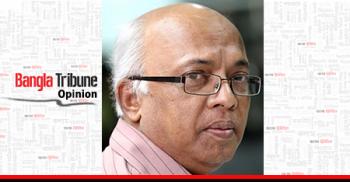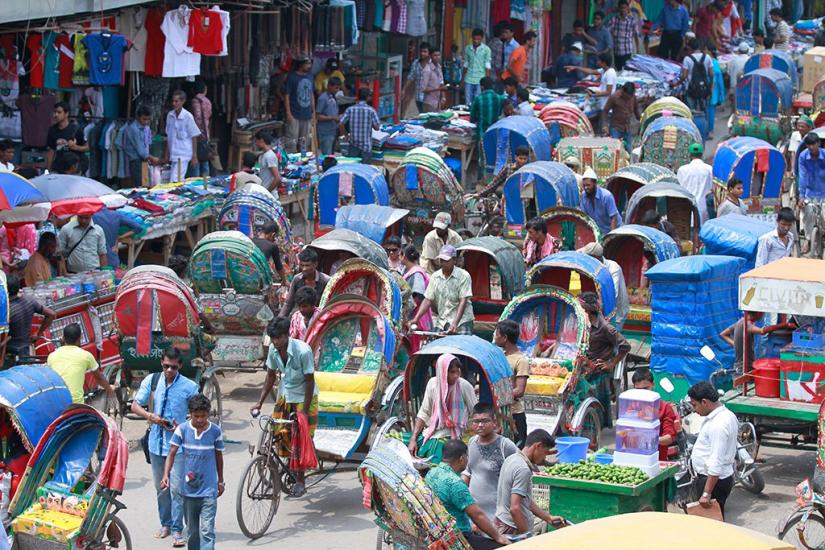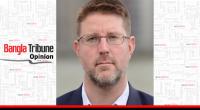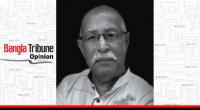 We had homes once upon a time, with charming gardens fronting those symbols of sophistication. Then came a time when crass commercialism crept into our consciousness. We gave those homes to real estate firms, who promptly reduced them to rubble and put up high-rise apartments in their place.
We had homes once upon a time, with charming gardens fronting those symbols of sophistication. Then came a time when crass commercialism crept into our consciousness. We gave those homes to real estate firms, who promptly reduced them to rubble and put up high-rise apartments in their place.
The homes became memory. Those gardens became a fairy tale.
We inhabited towns which breathed in the oxygen given off by their leafy trees. We felt the caress of the breeze wafting in from ponds and lakes and experienced the beauty of living. The world was an enchanting place. Then came an ugly era when those trees were struck down and those ponds and lakes filled in for monstrosities of buildings to arise, ghost-like, from their depths.
The trees exist in our imagination today. The breeze has died in the murderous embrace of superstructures.
There were once the small neighbourhood shops we collected our provisions from, the tailoring shops we ran to for new garments to be stitched from fresh cloth bought from stores that were part of tradition. We knew the shopkeepers, for they were our friends. We were all a family. Those shops have been put out of life and in their place have sprouted superstores and supermarkets, impersonal in their attitudes to us.
Those shops are a memory. The tailors we knew passed into silence long ago and live in the recesses of our fading thoughts.
Once upon a time, our fingers held the pen between them and we wrote essays, poems, letters and articles. We filled notebooks, in long hand, with our thoughts, scribbling and scratching out phrases and replacing them with fresh ones as we did so. Then the typewriter came in, to be soon followed by computers.
We hardly remember anymore the self-satisfaction that was handwriting. Indeed we do not write anymore because the laptop keyboard is there. Life is easier but without the thrill which once came of hard work.
There was a time when we scoured libraries and bookstores for works we needed to facilitate our term papers and research work. We spent endless days and sleepless nights noting down paragraphs and excerpts from those books, for we would need to build on them in the interest of academic excellence. Today, there is Google. There is Wikipedia. The old element of discovery is gone, for you do not go out in search of knowledge anymore. It is knowledge, minus the hard work, minus the creativity, which comes to you.
It is a story of loss we bear like a cross across our shoulders. It is the state of innocence and discovery we miss. And now, through informing us in all the arrogance of power they can muster, the city authorities would have us know that newer areas have been demarcated for our beloved, our loyal rickshaws to stay away from. In a country of millions of poor citizens, there are VIP roads. In a nation of the poor and the poorly-off lower middle class, cars owned by the rich, the traditionally wealthy as well as the nouveau riche, clog the streets and the roads of this our vast urban slum. Rickety buses, giving off soot and seemingly about to break down, turn life into a state of the comatose. Trucks in all their savage speed almost reduce us to pulp under their wheels.
And now, through informing us in all the arrogance of power they can muster, the city authorities would have us know that newer areas have been demarcated for our beloved, our loyal rickshaws to stay away from. In a country of millions of poor citizens, there are VIP roads. In a nation of the poor and the poorly-off lower middle class, cars owned by the rich, the traditionally wealthy as well as the nouveau riche, clog the streets and the roads of this our vast urban slum. Rickety buses, giving off soot and seemingly about to break down, turn life into a state of the comatose. Trucks in all their savage speed almost reduce us to pulp under their wheels.
And yet these men in the corridors of authority, of power, have again zeroed in on our rickshaws. In the narrow prism of their imagination, rickshaws are the enemy. The men who handle traffic on the roads do not see or are unwilling to see those cars and buses and trucks commandeer our roads and keep us hostage to their whims. But they come to life, indeed their batons spring to being busybodies when it is the poor emaciated rickshaw puller who must be disciplined for a minor infraction. On his scrawny back falls that stick and across his sunken cheeks land the policeman’s blows.
That scrawny rickshaw puller—with his thin legs and painful hands and sweaty physical being—is a friend we have known for long decades. The rickshaw is a mode of transport we who form the vast majority of citizens in this People’s Republic have taken advantage of in our movements from dawn to the depths of the night. Those poor rickshaw pullers in need of salt and water to replenish their energy have been our means of commuting from one end of town to another. We quarrel with them over fares; they are mortified by our behaviour. We are abusive toward them; they curse us in their souls. But at the end of the ride, at twilight, we are a fraternity that understand one another, a brotherhood the meaning of which the elite and the parvenus peopling the exclusive enclaves of the city cannot fathom.
Now we are being told that a fresh form of apartheid is on the way. Rickshaws are being outlawed on a few more streets and roads. For the mother who takes her child to and back from school, it is suddenly a new impediment she cannot leap across. For office-goers — men and women employed in humble careers, people who spend their entire working lives trying to devise the means of ensuring food on the table for their families — the decree against rickshaws is the height of insensitivity on the part of those we elect to office to make life somewhat comfortable for us.
For the rickshaw pullers, most of whom operate these three-wheelers on contract from the owners of the vehicles, this new whittling down of their space is a threat to the life and future of their wives and children and siblings and parents. Our policymakers do not comprehend the constricting power of poverty. They do not know the meaning of a hand-to-mouth existence. They cannot imagine the terrible ordeal a family goes through when its hungry children cry for food and then, tired and dried of tears, go off to uneasy sleep. But these men in authority do understand raw power. They know they must apply it against the powerless and the hapless in society. These are men who many moons ago, in their humble existence, moved around in rickshaws. Today they are the snobs who look upon rickshaws as a socially contagious disease that must be eradicated ruthlessly.
But here is the reality: the nearly three hundred thousand cars privately owned clog the roads in the nation’s capital and will do so even more when the rickshaws are pushed even more into the alleys; the thousands of buses and trucks making a misery of life will now run riot on our streets and our roads. These men of authority have gone after the rickshaws. They have not had the time or the inclination to go into thoughts of the miseries they are inviting by their behaviour. They will push the rickshaws off the streets and leave those who do not own cars, who cannot jump on to buses already packed with commuters, in the extremity of helplessness.
They are people who will remove a bridge from across a river, because they do not like the bridge. But they do not have the foggiest idea of what to replace it with.
Syed Badrul Ahsan is a political commentator and biographer of Bangabandhu Sheikh Mujibur Rahman and Tajuddin Ahmad.


